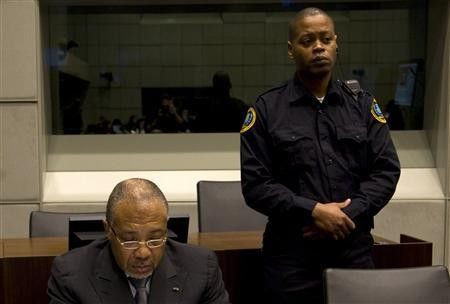Charles Taylor allowed to appeal over documents

Former Liberian president Charles Taylor, who boycotted his war crimes trial for a third day on Friday, was granted the right to appeal over key documentation for a case that has drawn international interest.
Taylor, the first African leader to stand trial for war crimes, has denied 11 charges of instigating murder, rape, mutilation, sexual slavery and conscription of child soldiers during the civil war in Sierra Leone in the 1990s.
Prosecutors accuse Taylor of directing Revolutionary United Front rebels who raped, killed and hacked the limbs off women, men and children in a campaign of terror, and say he sought control of Sierra Leone's diamond mines, using so-called blood diamonds from the conflict zone for profit or to buy weapons.
The case is being followed closely in West Africa, Europe and the United States because of the political and security implications, and a final ruling is expected later this year.
A U.S. diplomat has warned that if Taylor is acquitted or gets a light sentence, his return to Liberia could tip the balance in a fragile peace.
Taylor and his defence lawyer Courtenay Griffiths boycotted most of the hearings this week after the Special Court for Sierra Leone refused to accept the defence's almost 600-page final case summary because they filed it 20 days late.
But on Friday, the judges agreed to allow Griffiths to appeal that decision and postponed hearings for two weeks.
Griffiths welcomed the court's decision.
I think that reason is finally beginning to prevail and that by granting or allowing us permission to appeal the decision to refuse our final brief, we are on track now hopefully to bring this trial to an appropriate ending, Griffiths told reporters outside the court.
I am hopeful that we can file by Tuesday or Wednesday next week and then the members of the appeal chamber will deliberate on our application and hopefully thereafter we might get a result by the following week because I am sure everyone is anxious to bring these proceedings to a close, including us on the defence side.
Griffiths had requested an extension of the filing time limit before the January deadline.
He said he had been waiting for the judges to rule on eight legal matters and therefore had not been ready to file his summary.
Taylor's lawyer has questioned the Sierra Leone court's impartiality, citing leaked U.S. diplomatic cables which he says suggest Taylor's prosecution was politically motivated.
More than three years of testimony was due to end this week, but proceedings were briefly thrown into disarray on Tuesday when Griffiths stormed out of the court.
Justice Richard Lussick sharply rebuked Taylor and the defence, telling them: You're not running the court you know.
© Copyright Thomson Reuters {{Year}}. All rights reserved.





















